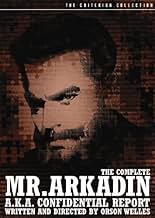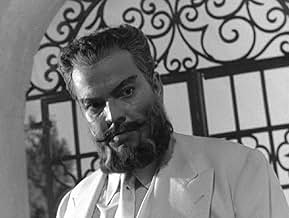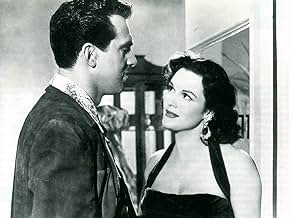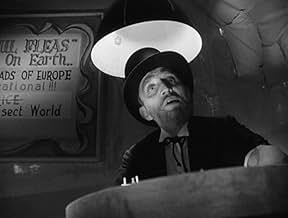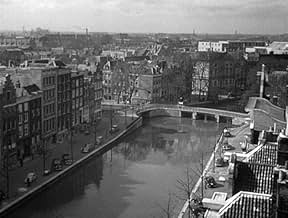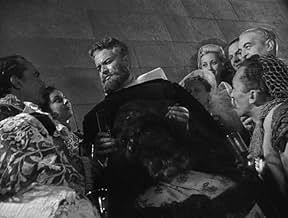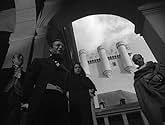Un avventuriero vuole ricattare il miliardario Arkadin, che fingendo di aver perso la memoria gli chiede di indagare sul suo passato. Ogni persona a cui l'investigatore si avvicina muore in ... Leggi tuttoUn avventuriero vuole ricattare il miliardario Arkadin, che fingendo di aver perso la memoria gli chiede di indagare sul suo passato. Ogni persona a cui l'investigatore si avvicina muore in circostanze misteriose.Un avventuriero vuole ricattare il miliardario Arkadin, che fingendo di aver perso la memoria gli chiede di indagare sul suo passato. Ogni persona a cui l'investigatore si avvicina muore in circostanze misteriose.
- Premi
- 1 candidatura in totale
- Oscar
- (as O'Brady)
- Woman in Apartment
- (as Tamara Shane)
- Secretary
- (as Terence Langdon)
- Parisian Woman with Bread
- (as Annabel)
- First Munich Policeman
- (as Gert Frobe)
- Second Munich Policeman
- (as Eduard Linker)
Recensioni in evidenza
And somehow it works - but only just.
If you haven't watched this film yet and are contemplating doing so I will warn you that Robert Arden's 100% subtlety free performance is incredibly bad and his character (Guy Van Stratten) has to carry the first part of the movie almost alone. Please just grit your teeth and put up with him (and the dodgy lip sync) for a bit, because what comes later is weird, deeply flawed, but bizarrely watchable semi-masterpiece. Dreamlike and occasionally very funny.
I would love to have seen Welles' version.
The music is perfect.
This movie is a mess, but it's a fascinating mess. The movie was taken out of Welles' hands in the editing phase and was released in various cuts all over the world over the course of a decade or more. The version I watched was assembled from all of the various versions, and supposedly most closely resembles what Welles wanted. It's still a slightly confusing jumble, but it's entertaining. It's unlike most movies of the mid 50's, with rapid edits, odd camera angles, and the aforementioned narrative structure utilizing flashbacks.
The sound is either mostly or all post-dub, which also adds to the disorienting effect. This movie has a lot of flaws (several shots are out of focus, Welles' fake nose looks terrible), but I found it an intriguing mystery, and I was never quite certain what was coming, which is exceedingly rare these days. Plus, the many brief appearances of classic character actors, such as AkimTamiroff, Katina Paxinou, Mischa Auer, and Michael Redgrave, all playing bizarre and eccentric characters, is amusing.
For those interested in investigating further, The Criterion Collection have done a wonderful 3 disc edition which collates all the available edits (including two Spanish versions which are known, hilariously, by the unexplained mis-crediting of the lead actor!?) and working them into a 'final' version hinted at by Welles' notes and conversations with the ubiquitous Peter Bogdanovich (who also features in the documentary, unsurprisingly). This 'final' version, while far from perfect, restores the original flashback structure as well as the original beginning and ending sequences. On the first disc, however, is the 'Corinth' version (originally discovered by Bogdanovich) that already incorporates some of the author's original intentions. This particular edit also features a highly illuminating commentary track by Welles scholars Jonathan Rosenbaum and James Naremore who consider this version to be the most satisfying. Also included are three mp3's of the aforementioned Harry Lime radio plays that had a direct influence on the story, featurettes by Welles biographer and actor Simon Callow, and a highly welcome reprint of the Mr. Arkadin novel (or novelisation? - you decide) with an excellent newly commissioned introduction by Robert Polito. All in all, this set is a must for the Welles aficionado and should be of interest to anyone with a true appreciation of cinema.
Mr Arkadin is a thriller about a man so afraid of losing his daughter's love and esteem he is willing to kill to maintain it. The story is pure genius: after an opening shot showing an empty aeroplane in mid-air, we flash back to a man found stabbed in the back. Hence Welles sets up two mysteries at once for us to think about. When the knifed man tells Arden's girlfriend two names that are worth a fortune, Van Stratten thinks to blackmail Mr Arkadin with this scant information. Arkadin calls his bluff, and instead confides in Van Stratten that back in 1927 he found himself in Prague wearing a suit with a lot of money in his pocket and no recollection of who he was or how he got there - total amnesia. He hires Van Stratten to find out who Mr Arkadin really is, and thus Van Stratten embarks on a voyage around Europe, trying to trace Arkadin's life back from 1927.
At each destination in Europe, Van Stratten finds Arkadin there too, so we learn that Arkadin has more on the mind than tracing his origins. And when the people Van Stratten interviews start dying, the suspense is shifted up another gear.
Were it not for the lame performance by Arden and the odd moment of awful dubbing, this flawed masterpiece may well have been held in as high esteem as Kane, Ambersons, Touch Of Evil and The Lady From Shanghai, rather than being relegated to Macbeth's 'interesting failure' status. Storytelling wise, this is Welles' at his best, and it's surreal, disturbing plot is more a meeting of The Lady From Shaghai and The Trial than Citizen Kane. Personally, I think this is a greater picture than Touch Of Evil's plain power-corrupts line and The Lady From Shaghai which depends on one high-concept set-piece after another.
I feel the film is weak in the following areas.
Sound: the entire soundtrack was re-recorded during post production with Welles himself doing the voices of many of the male characters and it is a constant distraction. Modern films are also re-recorded but they add room tone to prevent the sterile sound that plagues Arkadin.
Photography: The film has generally good photography but Welles use of weird angles distracts from the story rather than enhancing it. It is almost like another filmmaker is doing a parody of Welles. The footage of the airplane shown at the start of the film is covered by dirt on the lens on within the gate of the camera.
Production Design: Welles has very busy backgrounds shown in many scenes and with the use of deep focus causes a distraction rather than enhance the story. A better choice might have been to show the background at the beginning of a scene sequence and then have the actors appear in front of a more neutral background.
Makeup: Welles makeup is over the top and again is a distraction and lacks believability. The hairpiece, the beard and wedge shape nose are all too cartoonish. Welles also wore a fake nose in Touch of Evil but it worked well due to the quality of studio makeup artists.
Editing: There was many well lit shots that appear too briefly. One example, near the start of the film, at the docks where the lead character (Guy) is lined up with two other men. They are back-lit with their faces covered with shadows; Guy then walks backward into a beam of light which then exposes his face. But due to the erratic cutting, this shot is shown for only a brief second. This could have been caused by the editor who replaced Welles during post production.
The story itself is rather weak and it is often confusing. I didn't care much for the characters nor did I find them interesting. The film's ending was flat and didn't offer much closure to the open issues. The empty airplane shown at the start of the film does not generate enough curiosity for the viewer. Welles based the story on three Harry Lime radio shows (which are included on the new Criterion release discs). Nearly all of Welles other film scripts were based on adaptations of books. Welles seems to be an excellent screenplay writer and editor but perhaps a bit weak when it comes to content creation.
Acting: the actors who played Guy (Robert Arden) and Millie (Patricia Medina) were poorly cast for their parts. Both actors, Guy in particular, overacted most of the time and would be more at home in a B movie. But after watching a clip on Welles directing Arden, it seems that Welles is encouraging him to act in such a manner.
Lo sapevi?
- QuizThe voices of Mischa Auer (The Professor) and Frédéric O'Brady (Oscar) were dubbed by writer, producer, and director Orson Welles.
- BlooperOrson Welles' prosthetic nose disappears when Arkadin meets with Jakob Zouk.
- Citazioni
Gregory Arkadin: And now I'm going to tell you about a scorpion. This scorpion wanted to cross a river, so he asked the frog to carry him. No, said the frog, no thank you. If I let you on my back you may sting me and the sting of the scorpion is death. Now, where, asked the scorpion, is the logic in that? For scorpions always try to be logical. If I sting you, you will die. I will drown. So, the frog was convinced and allowed the scorpion on his back. But, just in the middle of the river, he felt a terrible pain and realized that, after all, the scorpion had stung him. Logic! Cried the dying frog as he started under, bearing the scorpion down with him. There is no logic in this! I know, said the scorpion, but I can't help it - it's my character. Let's drink to character.
- ConnessioniEdited into Histoire(s) du cinéma: Fatale beauté (1994)
- Colonne sonoreSaeta
Performed by Antoñita Moreno.
I più visti
- How long is Confidential Report?Powered by Alexa
Dettagli
- Data di uscita
- Paesi di origine
- Lingue
- Celebre anche come
- Confidential Report
- Luoghi delle riprese
- Aziende produttrici
- Vedi altri crediti dell’azienda su IMDbPro
Botteghino
- Lordo in tutto il mondo
- 4528 USD
- Tempo di esecuzione1 ora 33 minuti
- Colore
- Proporzioni
- 1.37 : 1
Contribuisci a questa pagina


